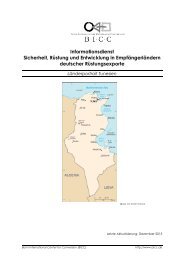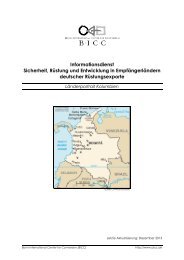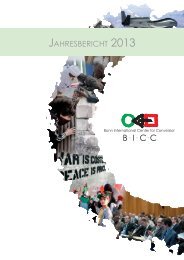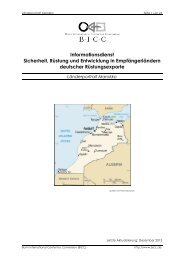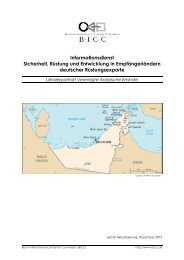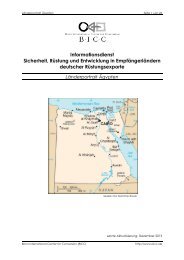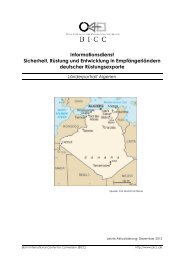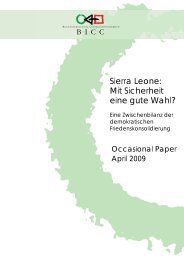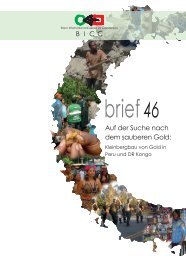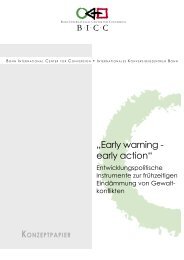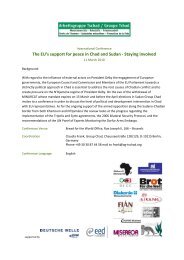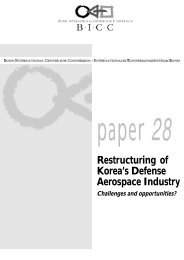English - BICC
English - BICC
English - BICC
Create successful ePaper yourself
Turn your PDF publications into a flip-book with our unique Google optimized e-Paper software.
the most part, been dormant<br />
throughout the years of the<br />
decommissioning deadlock, to enter<br />
the political fray and raise objections to<br />
the proliferation of sectarian violence?<br />
Not included: Loyalist<br />
dilemmas<br />
The UDA demonstrated its growing<br />
identity crisis, engendered by the<br />
changing political landscape, in their<br />
immediate defiant response to the<br />
IRA’s historic decommissioning<br />
announcement: “We’ll keep our<br />
guns…The IRA will never hand over<br />
their weapons. Nobody will. They’ll<br />
hand over some as gesture, but that’s<br />
it”(The Times, 23 October 2001); Jackie<br />
McDonald, a former commander of<br />
the UDA who spent ten years in the<br />
Maze prison for terrorist offences, said<br />
that the paramilitaries would keep their<br />
weapons to defend Loyalist<br />
communities against the threat of<br />
Republican attacks (ibid.). The ardent<br />
determination of Loyalists to hang on<br />
to their arms is reinforced by their<br />
conviction to maintain a “narrative of<br />
defence” (Zurawski, 2001), an outdated<br />
pattern of identity that serves to justify<br />
incitement, retribution, and retaliation,<br />
and thereby encourage the<br />
perpetuation of the self fulfilling cycle<br />
of violence.<br />
A broad public debate has been<br />
triggered, due to the continued<br />
sectarian tension and confrontation in<br />
the Ardoyne and elsewhere, about the<br />
deep-rooted frustration that exists<br />
within Loyalism. The shift in attention<br />
towards the grievances, fears and<br />
disillusionment that are commonplace<br />
within impoverished Protestant<br />
working class areas, should be<br />
interpreted as a positive reflex of the<br />
Northern Irish peace process. Moving<br />
beyond the customary provision of<br />
sympathy for the victims and the<br />
issuance of stern condemnations of<br />
the perpetrators, efforts to encourage<br />
public understanding of the root<br />
causes of violence is a relatively new<br />
and progressive approach to the<br />
complexities of peacemaking.<br />
The demise of the UDA’s political arm,<br />
the Ulster Democratic Party (UDP) on<br />
26 November 2001 signalled—in a<br />
highly disturbing fashion—the inability<br />
of a dominant strand of the Loyalist<br />
movement to achieve legitimate and<br />
credible political representation. The<br />
feeling of political irrelevance and<br />
exclusion has haunted working-class<br />
Loyalists since the beginning of the<br />
Troubles; electoral failure strengthened<br />
those forces within the UDA who were<br />
unhappy with the political direction the<br />
peace process had taken, writes<br />
commentator Jack Holland. According<br />
to Holland:<br />
“The UDA, never as well organized as the<br />
Ulster Volunteer Force, began to fragment. A<br />
faction under Johnny Adair wanted to resume<br />
violence while using the UDA’s resources to<br />
run a profitable drug-smuggling operation.<br />
Several “brigades” threatened to go independent.<br />
…The respectable Protestant workingclass<br />
vote eluded it, and there was never any<br />
chance that middle-class Unionists would be<br />
tempted to a party with such criminal links.<br />
In the end, the UDP manifested all the<br />
contradictions that were inherent within the<br />
UDA from the start … and men who<br />
aspired to real politics stood alongside pure<br />
criminals. Unfortunately, it was this, the dark<br />
side of the UDA, that finally won the battle<br />
for the soul of the organization” (Irish Echo,<br />
14 December 2001).<br />
One hopeful aspect of this kind of<br />
public analysis is that some of the<br />
central findings are gaining increasingly<br />
mainstream acceptance, both<br />
internationally and within Ulster<br />
Unionism. In early 2002, President<br />
Bush’s envoy to Northern Ireland,<br />
Richard Haas, called for more<br />
“sensitivity” towards Loyalist violence,<br />
as it stemmed “from painful<br />
transition”; Haas warned of the<br />
dangers posed by a reversal of<br />
historical trends, creating a “cold<br />
house” for Protestants (Irish Independent,<br />
10 January 2002; Guardian, 12 January<br />
2002). Personal advisors to David<br />
Trimble, such as Alex Kane<br />
(NewsLetter, 4 February 2002 ) and<br />
Steven King, have recently stressed the<br />
political relevance of the socioeconomic<br />
aspects of the Loyalist<br />
B·I·C·C<br />
cultures and markets of<br />
violence<br />
A poster campaign to reverse the focus on<br />
Republican arms (1999). Photo: Corinna<br />
Hauswedell<br />
dilemma, which have traditionally been<br />
overlooked and neglected in Northern<br />
Irish society:<br />
“For a whole swathe of young working-class<br />
Protestants, rioting provides an exciting<br />
interlude in otherwise hopeless lives….<br />
Economic prospects are correspondingly poor.<br />
Housing conditions are, arguably, worse in the<br />
Protestant areas. The relatively flourishing<br />
Catholic community is growing numerically<br />
while the Protestant community contracts.<br />
What many middle-class Protestants can<br />
rationalise as symbolic issues marginal to the<br />
constitutional position are seen by poor<br />
Protestants as erosion of their intrinsic<br />
identity” (Irish Times, 17 January 2002).<br />
The Protestant middle class opted out<br />
of the gloomy and sloping route<br />
through the Troubles. For the Loyalist<br />
working class—who joined<br />
paramilitary organisations in larger<br />
numbers than their Republican<br />
counterparts—it was this route that<br />
served to scatter the community and<br />
dilute its identity. This route led the<br />
community into social and political<br />
exclusion, transforming its fundamental<br />
outlook and purpose from one that<br />
valued the honourable calling of<br />
“defending the community” into one,<br />
devoid of morality and ethics, which<br />
engaged in ordinary crime. While a<br />
65



